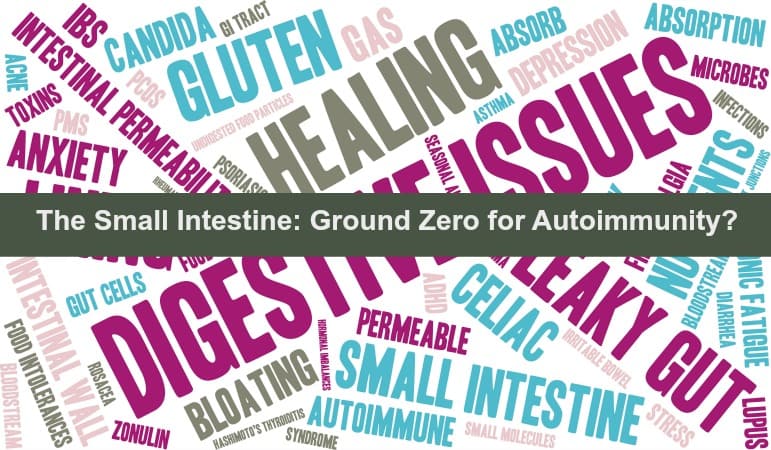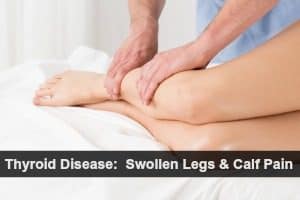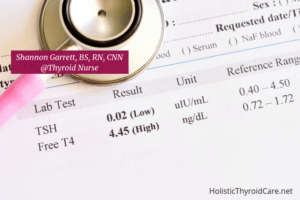
This week’s guest post is by Marc Ryan, L.Ac. of Hashimoto’s Healing from his new book, Roadmap to Remission. I had the pleasure of meeting Marc at the Thyroid Mastermind in Boulder, CO in October and love his work. I encourage you to check out his website and also get a copy of his book (which by the way is free! You simply pay shipping of $9.97).
In this guest blog post, Marc shares an excerpt from his new book, Roadmap to Remission and shares additional information from his blog.
Take a look at what Marc has to share with us:
As the title of this post suggests, I am a firm believer that the small intestine is one of the places in our bodies that autoimmunity forms and progresses.
And, therefore, it’s also a very important place for healing.
But before we explore this topic, I’d like to first share my own story so you can get a sense of who I am and where I’m coming from.
My Story
I have Hashimoto’s, my daughter has Hashimoto’s and my entire practice is devoted to studying, researching, treating and helping people recover from this disease.
I’m also a graduate of Cornell University and a licensed acupuncturist and herbalist who practices functional medicine. If you don’t know, this is a marriage of Western diagnostic testing and natural medicine.
I’ve been in practice about 13 years and I have an amazing life today. I’m able to be present for my family, spend time with my kids, walk my crazy dog twice a day.
I have the energy to do all this and to work with lots of people with Hashimoto’s. I’m excited about jumping out of bed in the morning.
Treating Hashimoto’s Is All I Do
I love what I do, and all I do is treat Hashimoto’s. It’s all I want to do. And there’s no end to the challenges, believe me!
This has enabled me to work with people all over the world and I am fortunate to have the clinical and personal experience to really help my Hashimoto’s patients. Something that mainstream medicine often struggles to do.
But, I didn’t really plan it this way, I didn’t wake up one day and decide to become “The Hashimoto’s Guy”.
I started my website Hashimoto’s Healing and our Facebook support group about 3 years ago (at the time of writing this) so that I could share information and support my patients.
My hope was to reach a few hundred people and share some things that I had learned. Since then, this has absolutely exploded.
This site and others that are devoted to helping people heal from Hashimoto’s and other autoimmune diseases have become popular and I’ve come to realize that there are millions of people worldwide suffering from this disease.
I Was Once Struggling Too
Trust me, a few years ago, I was one of those people struggling, not knowing what was going on.
Back then I co-owned a really big multi-disciplinary practice. We worked with MDs, chiropractors, physical therapists, acupuncturists, trainers, massage therapists, it was a huge outfit.
It was 4500 square foot space, we had about 12 employees and independent contractors. We had huge, scary monthly overhead. Just thinking about now it makes me stressed.
And we did well for a few years. And then, like many businesses, the Great Recession hit us hard. And it all crashed. It was incredibly stressful and it took a major toll on my health.
And I’ve seen this in a lot of people I’ve worked with, all that stress was the straw that broke the camel’s back.
All the Classic Symptoms
I was tired all the time, I couldn’t sleep, I was in pain, I couldn’t concentrate, my memory was shot, I couldn’t focus, my digestion was horrible, my joints hurt, I had gained about 20 pounds of bloating and inflammation, and the worst thing was I had this really bad eye pain that just wouldn’t stop.
Finally I went to a couple of eye doctors and one of them did a battery of tests. At that point they discovered that I had a marker called HLA-B27 which is seen in people with Crohn’s disease and something called Ankylosing Spondylitis, which causes the vertebrae in your spine to fuse.
I had some chronic back pain, but I didn’t really have any other symptoms, so they told me that we’d wait and see and when it got bad enough, they’d put me on immunosuppressants & pain relieving drugs to completely disable my immune system and, hopefully keep me out of pain.
As a functional medicine practitioner, that made no sense to me. Wait until it’s destroyed and then do something to disable another part of your body?
The truth is, if you have to live through that, it’s a gradual (or sometimes not so gradual) loss of function and quality of life. It’s miserable.
I’m Not Going that Route
Well… no! No, no. I didn’t want to go that route.
So I actually started treating myself using what I knew from functional medicine, I got on a strict autoimmune diet and took some supplements and through this, I was able to start to get my life back.
Then, something interesting happened, I lost those extra 20 lbs. and because I could actually see my body differently, I discovered some nodules on my thyroid.
I went to see an MD friend of mine and he sent me to have an ultrasound and some blood tests. Thank God, the nodules were not cancerous, but my antibodies were really high and I was diagnosed with Hashimoto’s.
And the funny thing was, I was in the same place all over again. Because my doctor said, “Yeah, you have elevated antibodies (at the time my TPO was 1200), but all your thyroid numbers are in the normal range.”
“So we’re going to keep an eye on it and when it gets bad enough, we’ll put you on Synthroid and that will take care of it.”
So, once again. Do nothing until my thyroid is sufficiently destroyed and then act. It was then that the light went in my head and I realized.
There is Nothing For Us
“Holy cow!” I thought to myself, most emphatically “…there is nothing for those of us who are in this in between stage of discovering we have autoimmune disease and major destruction of the tissue that’s being attacked. Nothing.”
This doctor was well-intentioned; he was a personal friend. I know he had my best interest at heart. Yet, that was all he had to offer.
It was then that I decided to devote my life to finding other ways of solving this problem and of turning people’s lives around before it was too late.
So I had to really step up what I was doing and I had to study a lot to try and figure out how to heal this because I was determined not to let it ruin my life.
I have kids, I couldn’t just throw in the towel and not support them.
I had to find answers that worked. And I can tell you there is a lot of conflicting information out there and a lot of complete nonsense.
I have had the good fortune to study with some of the best people in the world (like Dr. Datis Kharrazian) and to overcome it myself, to have over 2,000 consultations with Hashimoto’s folks and to help hundreds turn their lives around.
And during this process, I was gradually able to find my way, get away from the stress of my business, find some down time, stop being a workaholic (still working on that), deal with stress better, have fun, do things that weren’t always about work and money and, yet still maintain my income.
4 years and a lot of work later, I have a truly amazing life.
I have plenty of energy, I have very little pain, I have figured out how to effectively treat and reverse the brain fog that really made it hard for me to function and I have decided to commit my life to helping other people with Hashimoto’s turn their lives around.
My Mission in Life
So now, not only is it my profession, it’s my passion, and it’s personal. I’ve been joking with people lately saying it’s a blessing and a curse. A blessing because I really get it, and a curse because I really got it!
I am telling you all this because I really believe that my higher power has a plan for me and that is to be of service to people who suffer from Hashimoto’s.
Thanks for letting me share my story, here’s an excerpt from my book, Roadmap to Remission: A Practical Guide to Hashimoto’s Healing
The Small Intestine Is Ground Zero for Autoimmunity
Dr. Alessio Fasano, MD, an expert on the origins of autoimmunity has found the cause of this disease in the intestines. In a paper published in the Clinical Review of Allergy Immunology February 2012 , he noted that,
“Together with the gut-associated lymphoid tissue and the neuroendocrine network, the intestinal epithelial barrier, with its intercellular tight junctions, controls the equilibrium between tolerance and immunity to non-self antigens. Zonulin is the only physiologic modulator of intercellular tight junctions described so far that is involved in trafficking of macromolecules and, therefore, in tolerance/immune response balance. When the zonulin pathway is deregulated in genetically susceptible individuals, autoimmune disorders can occur.”
What that means in plain English is that the breakdown of the barrier of the intestines is the pathway to autoimmune disease.
We’ve already looked at the Metal and Earth Elements and we discussed how both are involved in autoimmunity. And we also discovered zonulin, “the zipper” of the intestinal walls.
A leaky gut or damaged intestine has been found in every autoimmune disease that has been tested including rheumatoid arthritis, ankylosing spondylitis, inflammatory bowel disease (Crohn’s disease and ulcerative colitis), celiac disease, multiple sclerosis, type I diabetes and, yes, Hashimoto’s.
In the small intestine this damage leads to immune system stimulation, the wrong types of things in the blood stream and, ultimately, a systemic problem that results in the loss of self-tolerance.
This means that the immune system gets so overwhelmed it can’t tell what our tissue is and what a foreign invader is.
SIBO: Small Intestine Bacterial Overgrowth
Another serious issue that we touched on earlier in the book was SIBO.
You may recall that SIBO stands for Small Intestine Bacterial Overgrowth.
This can be making your Hashimoto’s worse because bacterial gut infections constantly activate the immune system, which can make it difficult to manage the autoimmune part of this party.
Which Came First Leaky Gut or SIBO?
There are many causes of the breakdown of the intestines.
These include NSAID use, alcohol, gluten and other dietary proteins, bacterial overgrowth, environmental toxins and more.
And once this breaks down it alters the whole ecosystem of the gut. It’s hard to know which came first.
And at the end of the day, it doesn’t really matter.
What matters is what causes it and what we can do to heal it.
Symptoms of SIBO
SIBO has a number of possible symptoms, but mostly these involve bloating, gas, diarrhea and/or constipation.
The hallmark symptom is bloating and discomfort after eating certain foods.
Basically here’s what happens:
- The wrong type of bacteria end up getting into the small intestine. The migrate from the large intestine and take over.
- They feed on certain types of foods like sugars, galactans, fructans and starch.
- In reality, SIBO should be considered with abdominal discomfort after eating any of the following things:
– Starches
– Sugars/fructose
– Fructans
– Prebiotics
– Probiotics
– Fiber supplements
– Rice or pea powder from metabolic powders
– Galactans
You may notice that many of the foods listed here can also aggravate candida. And sometimes candida is blamed for what is actually SIBO.
5 Main Causes of SIBO
The causes of SIBO matter because when we understand the causes, we can figure out how to fix them.
These include:
1. Too little stomach acid.
Hashimoto’s and hypothyroidism leads to lower production of gastrin and stomach acid. This is super common. We learned about this in the section on the Earth Element.
Unfortunately, many people develop GERD or acid reflux and are prescribed proton pump inhibitors and antacids that just make everything worse.
2. An immune suppressed gut.
Many factors can lead to immune suppression in the gut. 2 important ones are long term corticosteroid treatment and chronic stress.
In either case, a lot of cortisol or corticosteroids cause the immune system to shut down and allows the party to get out of control.
With Hashimoto’s the body is under a great deal of physiological stress, all the time. Therefore, extra emotional stress and abnormally stressful events often result in people getting a lot sicker.
This is one of the reasons why.
3. Injury to the gut nervous system (known as the ENS or enteric nervous system)
The gut has been called the body’s “second brain” because it has its own nervous system and produces many of the neurotransmitters that are also produced in the brain.
Well, just like our other brain this can degenerate and break down with age and with diseases like chronic celiac disease, sceleroderma and IBS.
And just like neurodegeneration in the brain, this can be permanent. But also, just like the brain this second brain has remarkable plasticity and it can relearn things and rewire itself, too.
The gut brain and our main brain are both loaded with thyroid hormone receptors. With Hashimoto’s and hypothyroidism, there is often too little thyroid hormone or it’s not getting absorbed properly.
This can result in damage to the enteric nervous system (the gut brain).
4. Problems with the Vagus nerve
The Vagus nerve is a central highway for communication between the brain and the gut. When the vagus nerve stops firing into the gut this slows down everything.
This is a major cause of slower motility and constipation.
Thyroid hormone has a direct affect on movement through the entire gastrointestinal tract.
Thyroid hormones increase intestinal neurotransmitters, increase blood flow to the intestines and support the repair and regeneration of the intestines.
Hypothyroidism can slow movement through the esophagus, can affect muscle function in this area and can affect the nerves that cause movement.
Hypothyroidism also has an affect on the vagus nerve and this can lead both directly and indirectly to slowing movement through the intestines.
5. Anatomical or structural changes to the small intestines or illeosecal valve
Surgery to the gut (like appendectomy or resection), diverticulitis and scarring due to inflammatory bowel disease can all lead to this.
Hypothyroidism can lead to the loss of control of the ileosecal valve that is the doorway between the large and small intestine. When this stops working as it should it lets lots of critters from the large intestine into the small intestine.
Later in this chapter of my book, we review testing and modifying the Autoimmune Diet for SIBO. Yeah.
It’s a project.
Recap
1. The small intestine is a busy place. Lots of nutrient absorption and sharing. Lots of immune cells and immune activity.
2. Consequently it’s a place where a lot can happen, both good and bad. You can have an over active immune repines and flare ups.
You can have bacterial overgrowth and SIBO.
3. SIBO makes you a gas factory and can lead to lots of other issues, like digestive, skin related and neurological problems.
4. The answer is diet. Plain and simple.

If you have any questions or comments, please feel free to contact Marc Ryan at [email protected].
Hashimoto’s: Is the small intestine ground zero for autoimmunity? https://t.co/1zLLYfCo8a
— Shannon Garrett (@AutoimmuneRN) December 1, 2015






WOW!
Marc really clears this up. I’ve been following him for some time and bought the book on Amazon. i feel i am making progress with recovery since knowledge is power and Marc is very empowering….in the way that he so generously shares his knowledge accumulated from his own experience and from helping others. I hope YOU are making your way too! xx
Hi Mary,
Thanks for commenting. I’m glad you enjoyed the post. Marc Ryan is an inspiration and I admire him for his commitment to helping people who are struggling with Hashimoto’s…hence, I am honored that he offered to write a guest post for my blog so that his wisdom and expertise could be shared with my followers and clients.
Wishing you great health!